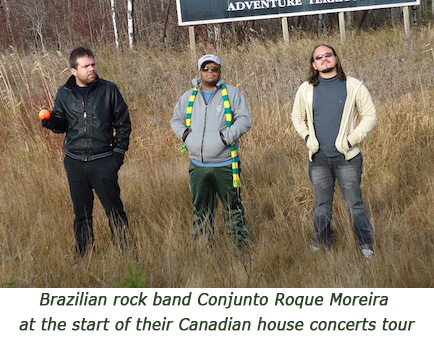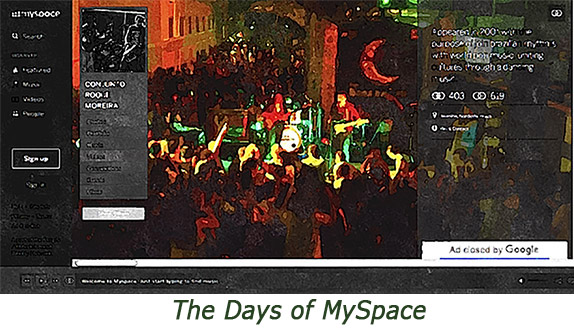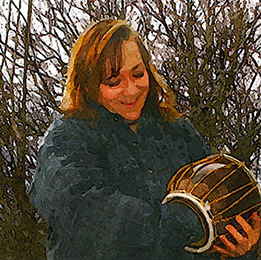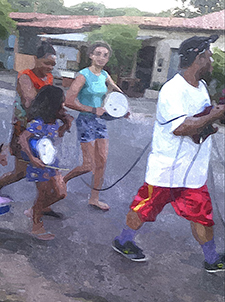 What I’m about to describe is a series of events that couldn’t have taken place before the year 2000, for reasons that will soon become clear.
What I’m about to describe is a series of events that couldn’t have taken place before the year 2000, for reasons that will soon become clear.
The group home organisation Jade and I worked for needed to reduce its staff, so they decided to hit two birds with one stone and fire the union’s troublemaking president and vice president. We were negotiating a first collective agreement, so firing us was illegal. Jade got a job at a women’s centre, where she did much good. Not being able to find a job myself, I decided to use the settlement money to go back to school.
Lesson 1: This could never have happened without the availability of online study.
I was living in a log cabin in the woods, far from any university, with dial-up Internet. While taking courses in psychology and labour studies from Athabasca University I started writing about music for The Voice, the webzine of the university’s student union. While looking for new music on MySpace, I discovered Conjunto Roque Moreira.

Lesson 2: This couldn’t have happened before the burgeoning of social media in the early 2000s.
The band blew me away with its potent sound, multiple genres, clever lyrics, manic stage performances, and tender social conscience. I quickly got in touch, requesting a CD and an interview.
Lesson 3: This could never happened without Google Translate.
Conjunto and I struggled to communicate. Anderson Almeida, the guitarist, could speak a little English and I spoke less than no Portuguese. I turned to Google Translate, an online tool That’s been allowing people to confidently make fools of themselves in other languages since its inception. I emailed them a bunch of questions. They mailed me their self-produced debut CD.
Lesson 4: This could never have happened without digital recording technology.
I’ll always be a flag-waving Vinyl Kingdom patriot, but I have to admit that digital technology was a huge boon to indie artists, providing a means of creating and distributing recordings?first by burning CDs and later by creating mp3 downloads?without the aid of big business. Those who wanted to create and distribute their own music could now do so comparatively cheaply, before achieving staggering success and without having to impress some CEO who knew nothing about music and probably hated it. They could go straight to listeners and build their own followings.
After I published a review and an interview with the band, they asked me if I could help them get a tour in Canada. I didn’t know whether to laugh or cry, but it happened that I’d just interviewed North Carolina folksinger Jonathan Byrd, whodunnits’d introduced me to a new Canadian touring model that was allowing some indie musicians to make a living.
Curious, I got in touch with one of these newfangled organisations, Home Routes (Chemin Chez Nous), which lead to an interview with artistic director Mitch Podolak. Home Routes would select suitable applicants and send them on a tour of homes in rural Canada. The hosts were volunteers who asked for no reward but the privilege of hosting and personally getting to know gifted musical artists. The hosts, who needed to have a performance space in their homes in order to qualify, would invite local people over to hear the performers play, charging $15.00 a head. The musicians would keep it all.
Lesson 5: This could never have happened had artists and music lovers not risen to the challenges of the new musical landscape, finding innovative ways to free music from corporate control.
 I told Anderson about Home Routes. I emailed a letter to Home Routes, recommending Conjunto Roque Moreira. At Anderson’s request I emailed another letter of recommendation to the appropriate cultural department of the Brazilian government. Frankly, I was just being nice; knowing from experience the nightmare of red tape sometimes required to enter Canada, I fully expected it all to come to nothing.
I told Anderson about Home Routes. I emailed a letter to Home Routes, recommending Conjunto Roque Moreira. At Anderson’s request I emailed another letter of recommendation to the appropriate cultural department of the Brazilian government. Frankly, I was just being nice; knowing from experience the nightmare of red tape sometimes required to enter Canada, I fully expected it all to come to nothing.
But before I knew it the band was in Manitoba gladdening hearts in one house concert after another. Conjunto sent me photos of the bandmembers being embraced and applauded by hordes of chubby chortling Canadians and Home Routes thanked me for recommending this great band. Conjunto asked me to come see them, as they had a thank-you gift for me. Unfortunately I was three hours away by air. I gave them my heartiest congratulations and apologised sadly for not having the wherewithal to make it to one of their performances.
So they mailed me the gift. It was a cuica, which means “opossum” in Portugese. It looks like a drum but is played by rubbing a wet cloth up and down a wooden rod inside, making that adorable squeaky noise you hear in bossa nova and samba.
 The truly remarkable thing about this instrument is that once Conjunto Roque Moreira figured out how to make cuicas and many other instruments from natural and recycled materials, they began teaching local street children how to make and sell them to earn a few needed reals.
The truly remarkable thing about this instrument is that once Conjunto Roque Moreira figured out how to make cuicas and many other instruments from natural and recycled materials, they began teaching local street children how to make and sell them to earn a few needed reals.
Lesson 6: This glorious blend of art and compassion could never have been realised except by people still connected to their communities.
Parallels of this story were happening the world over as musicians grappled with changing conditions and growing corporate control. Those who won did so, as did Conjunto Roque Moreira, by jettisoning their egos, skirting the starmaker machinery, guarding their humanity, and seeking inventive ways to benefit from the new technologies.
Wanda also writes the blog The Mindful Bard:The Care and Feeding of the Creative Self.


